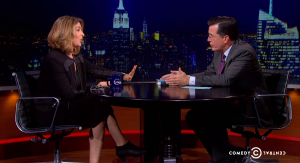“I haven’t finished reading the book; I don’t want to know who wins, capitalism or the climate, but I assume it’s capitalism because the book costs $30 and it’s printed on dead trees.”
–Stephen Colbert, interviewing Naomi Klein (23 Sept 2014)
 Klein’s new book This Changes Everything sets out the urgency of climate change and how Big Capitalism works. Much of her argument chimes perfectly with Astraea’s view – that climate change is happening; that it’s extremely urgent to reduce greenhouse gas emissions; that our relationships with nature must change; and that globalisation is giving multinationals unprecedented access to cheap labour, and monetising other people’s disadvantages. That’s the negative side of capitalism.
Klein’s new book This Changes Everything sets out the urgency of climate change and how Big Capitalism works. Much of her argument chimes perfectly with Astraea’s view – that climate change is happening; that it’s extremely urgent to reduce greenhouse gas emissions; that our relationships with nature must change; and that globalisation is giving multinationals unprecedented access to cheap labour, and monetising other people’s disadvantages. That’s the negative side of capitalism.
But she misses the point. Capitalism is a tool. Just a tool. It can be used for good and for evil. No better means of exchanging value has appeared. In fact, when Klein describes the globalisation and free trade zones as deals between Big Business and government to get easy access to cheap labour and similar advantates, she’s not describing capitalism. She’s describing collusion, corruption, cronyism. Business and government have failed us in policies and priorities, but it would be misleading to pretend that capitalism is broken – as Colbert’s remark underlines, it worked perfectly to get Klein’s book into many people’s hands, quickly.
Capitalism gives us power, and with power comes responsibility. If we don’t like the world, we must change it. Educate ourselves as to how things are produced, choose products with no or recycle-able packaging, choose local holidays instead of flying abroad, choose organic foods, choose ethical labels.
We use capitalism every day to promote our beliefs and choices. Everything we buy is recorded and analysed, and retailers make their purchasing decisions based on what we buy today. They market to us based on our prior purchases (and even “views”, online). That’s why, for example, when I was pregnant, my purchasing patterns signaled to stores that I would soon need baby goods, and began to receive promotional material months before the baby arrived.
Unfortunately, people who ‘value goals such as achievement, money, power, status and image’ tend to behave in unsustainable ways and hold more negative attitudes toward the environment (Klein quoting Kasser & Crompton 2009). Those are the very same people who tend to run those powerful multinationals.
Individuals know that their decisions always impact others – whether at high levels or in the local shop. That’s where the paradigm shift must happen: we must care, individually and collectively, enough to change our own behaviour. Fast.
So don’t blame capitalism – just make it your weapon of mass improvement.
It might already be too little too late. But do you really want to wait any longer to start trying?
Read our book about a personal story of change – from venture capitalist to organic farmer http://www.abigpicturestory.com/

Comments